Young Romanian researcher gets EUR 1.5 mln from the European Research Council for her project

The Intertrap project, developed by young Romanian researcher Alida Iulia Gabor from the Babes-Bolyai University in Cluj-Napoca, will receive a EUR 1.5 million grant from the European Research Council (ERC).
Within this project, the Romanian aims to develop a new technique that will accurately date the ice ages and global warming periods, over a period that starts 2.5 million years ago and ends today.
The project’s objective is to provide details of past climate change, thus providing information to the researchers who are trying to understand current and future trends in the field. The new technique will test samples of loess (a category of soil that covers about 10% of the Earth’s surface) from around the world, and will integrate different optic and spectroscopic methods.
“We need to keep our most talented researchers in Europe while attracting the new and diverse perspectives of top researchers from elsewhere in the world. These grants ensure many of the world's most exciting ideas are developed right here: giving researchers and scientists the freedom and security to pursue their careers and ambitions on our continent,” said Carlos Moedas, the European Commissioner for Research, Science and Innovation.
A total of 291 early-career researchers will receive a total of EUR 429 million from the ERC (up to EUR 1.5 million per grant). The grants are awarded under the 'excellent science' pillar of Horizon 2020, the EU's research and innovation programme.
Romania ranks last in the EU for research expenses to GDP
Irina Popescu, irina.popescu@romania-insider.com













